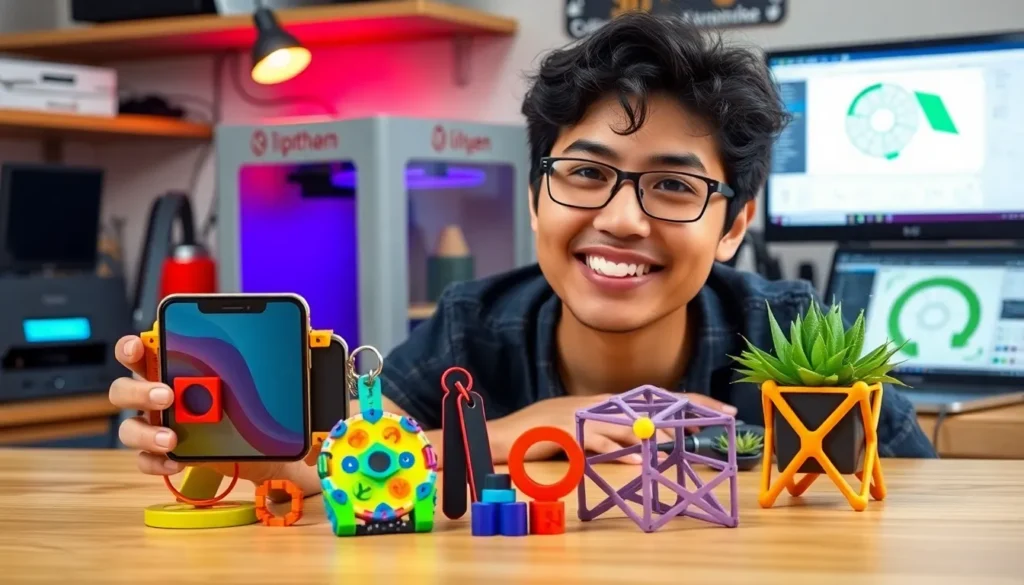Table of Contents
ToggleIn today’s fast-paced world, networking isn’t just about swapping business cards and pretending to remember names. It’s about building genuine connections that can propel careers and spark opportunities. Think of networking as the social lubricant for your professional engine—without it, things might just stall.
Whether you’re a seasoned pro or just starting out, mastering effective networking strategies can feel like trying to solve a Rubik’s Cube blindfolded. But fear not! With the right approach, it can be as easy as pie. This article dives into practical tips and clever tactics that’ll help anyone navigate the often intimidating waters of networking. Get ready to turn those awkward small talk moments into meaningful conversations that could change your career trajectory.
Importance Of Networking Strategies
Networking strategies play a crucial role in professional growth. They provide opportunities for collaboration, mentorship, and knowledge sharing. Establishing strong connections enhances visibility in chosen industries and opens doors to new avenues.
Effective strategies lead to lasting relationships that extend beyond mere introductions. Gaining insights from others’ experiences offers valuable perspectives that can shape career decisions. Engaging in meaningful conversations fosters a sense of community and support.
Professionals who prioritize networking increase their chances of finding job opportunities or prospective clients. Having a well-defined approach helps individuals maximize their time and resources during networking events. Targeting specific groups or industries proves beneficial in cultivating relevant contacts.
Research indicates that over 70% of jobs aren’t advertised, highlighting the importance of leveraging connections. Forming genuine relationships often results in valuable referrals and recommendations. Sustained engagement with networks tends to yield long-term benefits for personal and professional growth.
Utilizing social media platforms further amplifies networking efforts. Platforms like LinkedIn allow professionals to showcase their expertise while connecting with industry peers. Curating a personal brand online establishes credibility and encourages others to reach out.
Regular follow-ups strengthen connections and demonstrate commitment. Attending industry conferences or workshops creates additional touchpoints for interaction. Exploring new networking channels expands reach and introduces fresh opportunities.
Prioritizing effective networking strategies becomes essential for anyone looking to advance their career. The continual effort to build and maintain relationships can significantly impact success and lead to growth.
Types Of Networking Strategies

Networking strategies encompass various approaches that serve different purposes. Understanding these types enables individuals to create a tailored networking plan.
Personal Networking
Personal networking focuses on building genuine relationships outside of professional obligations. Engaging with friends and family often opens doors to new connections. Attending social gatherings or community events enhances visibility among diverse groups. Sharing experiences and interests fosters trust, making it easier to exchange support and ideas. Regularly reaching out to acquaintances strengthens bonds and nurtures long-term connections. Emphasizing authenticity in these interactions leads to a strong personal network that can be beneficial in unexpected ways.
Professional Networking
Professional networking prioritizes career advancement and industry-related relationships. Joining industry-specific organizations plays a significant role in expanding professional contacts. Attending conferences and workshops enables access to influential figures and valuable knowledge. Engaging on platforms like LinkedIn amplifies one’s professional presence and credibility. Participating in online discussions or webinars showcases expertise and attracts like-minded professionals. Consistent follow-ups with contacts maintain relationships and demonstrate commitment, ultimately resulting in career growth and new opportunities.
Effective Networking Techniques
Networking requires strategic approaches to foster meaningful relationships. Readers will find that implementing effective techniques enhances opportunities and career growth.
Building Relationships
Establish mutual trust through shared experiences. Attending social gatherings cultivates personal connections that often lead to unexpected opportunities. Listen actively to foster deeper conversations, allowing others to express their thoughts and insights. Follow up with personalized messages to demonstrate genuine interest and remember important details. Creating a networking plan encourages regular engagement with contacts, reinforcing the commitment to maintain relationships. Successful networking often relies on reciprocal efforts, ensuring both parties benefit from their connection.
Leveraging Social Media
Utilize platforms like LinkedIn to enhance professional visibility. Engaging with industry-relevant content drives connections and expands networks. Share insights and expertise, positioning oneself as a valuable resource within the community. Connect with professionals in the field by sending personalized invitations that highlight common interests. Participating in online discussions fosters relationships and builds credibility among peers. Regularly updating profiles keeps connections informed about accomplishments, maintaining relevance in chosen industries.
Common Networking Mistakes
Networking mistakes can limit career growth and relationship-building opportunities. Focusing on avoiding these missteps can significantly improve networking effectiveness.
Lack Of Follow-Up
Failing to follow up after an initial meeting hinders relationship development. Contacts may forget conversations if no further communication occurs. Sending a quick email or message reinforces interest and fosters trust. Engaging with shared content or mentioning a relevant topic shows genuine investment in the connection. Not establishing this ongoing dialogue can lead to missed opportunities. Expecting contacts to remember every detail without follow-up creates a sense of disconnect.
Being Too Transactional
Approaching networking with a purely transactional mindset limits connection depth. Viewing interactions solely as opportunities can feel disingenuous. Building relationships involves investing time and energy into mutual interests. Genuine engagement leads to stronger bonds, making it easier to collaborate in the future. Networking should focus on creating value for both parties rather than extracting immediate benefits. Balancing personal and professional interactions fosters a supportive network, which amplifies long-term rewards.
Networking is an essential component of career advancement and personal growth. By implementing effective strategies individuals can transform their approach to building connections. It’s not just about making contacts but about nurturing relationships that can lead to valuable opportunities.
Prioritizing genuine engagement over transactional interactions creates a supportive network that fosters collaboration and mentorship. Utilizing platforms like LinkedIn and participating in industry events can amplify visibility and strengthen professional ties.
Ultimately, investing time and effort into networking pays off by opening doors to new possibilities and enriching one’s career journey. Embracing these strategies empowers individuals to navigate their professional landscape with confidence and purpose.










